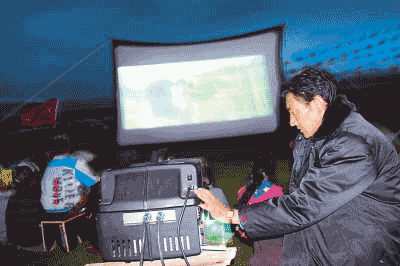
Projectionist Tsering Paljor is showing the movie for villagers.[Phpto/China Tibet Online]
On the rugged road, a lonely man walks forward firmly, pulling two rented horses, which carry an electric generator and boxes printed with digital projectors for pastoral areas. This is the typical scene of projectionists going to countryside in Tsomey County of Tibet.
Tsomey, with an elevation of approximately 4500 meters above sea level, is a key county for poverty alleviation and development. Although highways became accessible several years ago, the transportation of the whole county is still inconvenient with its rocky dirt roads in most areas.
In order not to delay the film screening, projectionist Tsering Paljor often gets up very early, climbs the mountains, crosses rivers and passes the prairies.
“Without hearty breakfast and lunch, I arrive at the destination after several hours of walk, totally exhausted,” Tsering Paljor said.
“It is only possible for us to rent horses carrying machines from the town to the countryside and as for accommodation, we usually sleep over in the house of a relative or villager,” said Sonam Kalsang, the leader of the projection team.
There are only 6 members in the team while there are 4 towns and 16 villages in the county; therefore, everyone takes charge of a wide area. Most of the time, projectors have to set out alone, carrying the devices on his back for there is no car, bringing the electric generator for there is no electricity in the village and singing aloud in the wilderness to get rid of loneliness for there is no companion.
The whole village rejoices when the horn blares. For best screening effect, projectionists sometimes have to climb the trees or telegraph poles to hang the screen, which is also the biggest headache for them.
“Among the movies we show are Serfs, Drolma, On the Mountain of Tai Hang, the Gunshots Over the Plain, and so on. These films are all translated into Tibetan,” Sonam Kalsang said.
At the same time, they broadcast some public service announcements, telling villagers how to prevent fire and theft and how to secure a safe journey as well as tips on life and production.
The trip usually takes the staff a few months, with a minimum length of 20 days. For all year round, they have no time to spare even if it is harvesting season. Even when they get sick, they can find no time to see a doctor.
Since 1984, Tsering Paljor has screened films for 29 years in Zhegu Town, which witnessed his change from a young boy to an old man.
Because his long career on the plateau with an elevation of 4500 meters, he gets rheumatoid arthritis. It is so severe that he cannot even walk sometimes. Regardless of doctor’s advice on hospitalization, he still stays in his post, day and night.
